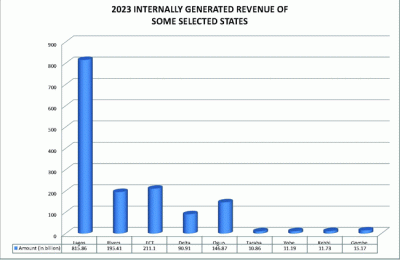Sample 1: “He further stated that they should access a government based on performance, adding that they shouldn’t let ethnicity and religion divide them.” (It hurts me when educated people in Ikoyi voted against APC—Osoba, Opera News, 7 March, 2023)
The word of interest is access which occurs in the following context: “They should access a government based on performance…” The context does indicate that the word (access) means to evaluate, to judge, to review, to form an opinion. The idea is that people should evaluate a government on the basis of its performance. But that is not the meaning of access.
The reporter has confused the word assess with access, a function of poor pronunciation and poor spelling. We have repeatedly advised readers to be attentive to slight differences in pronunciation and spelling that communicate lexical and semantic differences. In English, many times it does not require more than the presence or absence of a single letter in this or that position for a lexical item to transform into another word. Anyone who is not sensitive to these instances of lexical morphing is still a stranger to the English language.

Yes, there is a major difference between access and assess, significant enough to make them two words.
Capable of being used as a noun and a verb, the word access means having opportunity or right to use a thing, acquire a thing, enter a place, approach a person, etc.: (1) The business is not expanding because the owner does not have access to sufficient funds. (2) In spite of the media hype, the masses have no access to the low-cost houses. (3) The only access to the village is through a bumpy, dusty road. (4) Close to half a century of its existence, many people around the world still have no access to the email. (5) For more than two weeks now, I have not been able to access my mail. (6) Even Ministers do not have direct access to the president. (7) Three years after the divorce, the man has no access to his children. (8) Only by special permission can the room be accessed through that door. (9) For the country to make great strides in agriculture, farmers must have access to fertilizers and expansive land. (10) The man’s situation is worsened by the fact that he has no access to his lawyer.
Now the word assess is about evaluating, examining, trying to understand a situation, etc. It is a verb, whose noun form is assessment: (1) Experts are assessing the effects of the erosion on the environment. (2) The committee members will soon begin to assess the facts before them. (3) She says she is in the process of assessing how much love the man has for her. (4) Before the loans can be released, representatives of the bank will need to assess your production capability. (5) The purpose of our visit is to assess your facilities comparing them with the claims you make in the documents. (6) You cannot effectively tackle your political enemies without first assessing their strengths and weaknesses. (7) Before the Doctor can undertake to treat him, he must assess the extent of the damage done by the quack Doctor. (8) It is the duty of the Vehicle Inspection Officers to assess the road-worthiness of all vehicles. (9) An engineer from the Federal Ministry of Works is here to assess the quality and extent of work done so far. (10) Each applicant must be assessed objectively and impartially. 11) My assessment of him is that he is an intelligent but pompous man. 12) If journalists were not biased in their assessment, they would know that this man is unfit to rule a state. 13) I don’t believe the assessment of the new product was thorough enough.
At any rate, the verb assess should replace access in the context under examination.

Sample 2: “According to the Punch News, the APC Governors want the presidential flag bearer to come from the North to be able to win Alhaji Atiku Abubakar… (Here is where APC Governors want the APC Presidential aspirant to come from, Opera News, 3 June, 2022)
I draw readers’ attention to the verb win which occurs in the following context: “the presidential flag bearer to come from the North to be able to win Alhaji Atiku Abubakar.” The context speaks about winning Alhaji Atiku Abubakar. Can you win a person? Very unlikely, unless the person is a prize. The appropriate word for that context is defeat. In the sense in which the writer has used the word in the context, you cannot win a person. But you can defeat him. The error associated with this wrong choice is a common feature of Nigerian English usage.
Our next task is to differentiate the two words (win and defeat) in practical usage. Please read the following sentences: 1) However hard the team may try it cannot win that match. 2) The team won the match through a last-minute goal. 3) The nation can win the war against drug abuse only by determination and sincerity. 3) The man won the battle against death by submitting to his doctor’s instructions and prescriptions. 4) Neither the Federal Government nor the Biafrans won the Nigerian Civil War. 5) No one can win the battle of life without the help of God. 6) One of the aims of science is to win the war against sickness and disease. 7) Deforestation is a war against nature which can be won only at the expense of healthy human existence. 8) Can a Yoruba wife win the war against her mother-in-law? 9) Every society must win the war against illiteracy and ignorance. 10) Nigerian journalists have won many prestigious international awards. 11) Scholars compete with one another to win international grants. 12) Your rating as a scholar depends on how many grants you have won. 13) Nigeria must win the war against ecological degradation especially in the oil-producing areas. 14) He has been fighting a life-long battle with cancer which he thankfully won. 15) The major prizes are being won by young boys and girls. 16) Huge contracts are being won by business upstarts. 17) Wole Soyinka won the Nobel Prize for Literature in 1986. 18) His novel has won numerous international prizes. 19) The lawyer won three major political cases in a row. 20) Money alone is not enough to win a woman’s heart. 21) She won three gold medals in the last Olympic Games.
Now we offer some sentences on the usage of the verb defeat: 1) Having been defeated several times by his political opponents, he withdrew from the race. 2) Once you allow yourself to be defeated in the mind, you have already failed. 3) There is no team that cannot be defeated. 4) We defeated you because we had more experience. 5) The Nigerian Armed Forces have defeated and ousted the insurgents. 6) Truth may seem weak and to have an appearance of being easily defeated; it shall always triumph ultimately. 7) In a surprising twist, the female team defeated its male counterpart. 8) The colonisers took over our land after defeating our ragtag army. 9) The Allied Forces defeated Germany in the Second World War. 10) The world seems to have defeated the Covid-19 pandemic. 11) The man defeated his accuser in court. 12) Before their defeat, the team thought they were the most powerful in the world. 13) Their defeat can be ascribed to carelessness. 14) The team suffered a humiliating defeat. 15) Every defeat prepares you for the next victory. 16) He did not have an appearance of someone who had experienced defeat.
In the last five of those sentences, the word defeat has been used as a noun.
Do not say or write: The Super Eagles won Bafana Bafana. Say or write: The Super Eales defeated Bafana Bafana; Do not say or write: The lawyer won his colleague in court. Say or write: The lawyer defeated his colleague in court. Or: The lawyer won the case. Do not say or write: The Allied Forces won Germany in the Second World War. Say or write: The Allied Forces defeated Germany in the Second World War. Do not say or write: You won me because I was careless. Say or write: You defeated me because I was careless. Do not say or write: I will easily win you in this game. Say or write: I will easily defeat you in this game. Do not say or write: Our school won their school in the quiz competition. Say or write: Our school defeated their school in the quiz competition. Do not say or write: Alhaji Ganiyu won Malam Haruna in the general election. Say or write: Alhaji Ganiyu defeated Malam Haruna in the general election.
READ ALSO FROM NIGERIAN TRIBUNE







